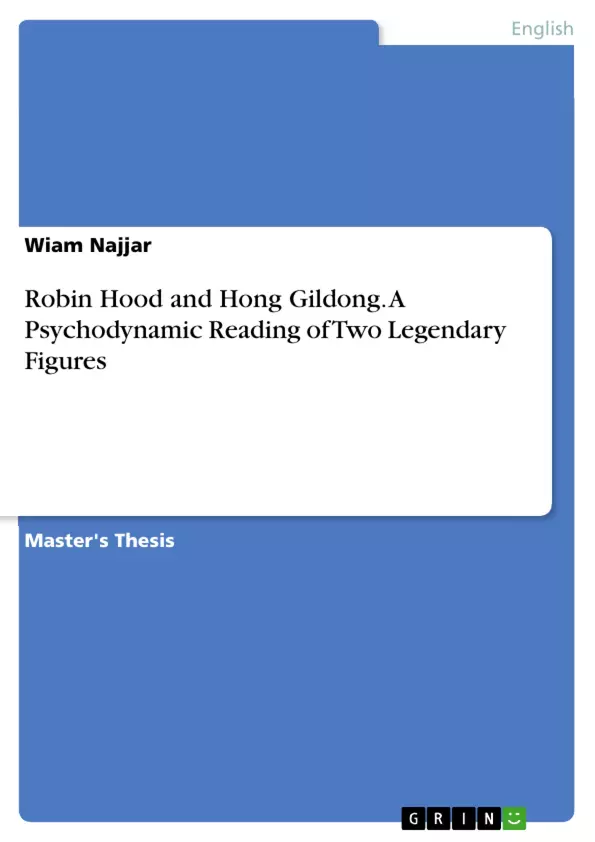Robin Hood and Hong Gildong are two popular characters who have developed in literature and media over centuries with the development of their respective English and Korean cultures. By interacting with other disciplines and examining some related media, this paper will utilise interdisciplinarity as well as intermediality to help better understand the evolution of the two characters.
This dissertation will study the development of the two characters using the main psychodynamic theories, Psychoanalysis, Analytical Psychology and Individual Psychology. The focal principles of theorists Sigmund Freud, Carl Jung and Alfred Adler will be relied on throughout the study to help analyse the motives behind the two characters’ actions and change in personalities. Other cultural, social and political factors will also be considered.
Inhaltsverzeichnis (Table of Contents)
- Abstract
- Introduction
- Chapter One: Robin Hood: a Product of the Environment, Circumstances and Ploys of the Mind
- Chapter Two: Hong Gildong: a Hero of the People
- Conclusion
- Works Cited
Zielsetzung und Themenschwerpunkte (Objectives and Key Themes)
This dissertation aims to analyze the development of the legendary figures Robin Hood and Hong Gildong through the lens of psychodynamic theories, specifically focusing on the contributions of Sigmund Freud, Carl Jung, and Alfred Adler. The study will utilize an interdisciplinary and intermedial approach, examining the evolution of these characters within their respective cultural contexts and across various media representations.
- Psychodynamic analysis of Robin Hood and Hong Gildong's personalities and motivations.
- Examination of the cultural, social, and political influences shaping the characters' development.
- Interdisciplinary approach integrating literary analysis with psychological theory.
- Intermedial analysis of the characters' representations across different media.
- Comparative study highlighting similarities and differences between Robin Hood and Hong Gildong.
Zusammenfassung der Kapitel (Chapter Summaries)
Chapter One: Robin Hood: a Product of the Environment, Circumstances and Ploys of the Mind: This chapter delves into a psychodynamic exploration of Robin Hood's character, examining how his environment, circumstances, and the complexities of his mind shaped his actions and personality. It likely utilizes Freudian, Jungian, or Adlerian concepts to dissect Robin Hood's motivations, exploring his relationship with authority, his social rebellion, and the psychological underpinnings of his heroic deeds. The chapter likely analyzes how his experiences contributed to his personality traits and the development of his legendary status.
Chapter Two: Hong Gildong: a Hero of the People: This chapter provides a comprehensive psychodynamic analysis of Hong Gildong, exploring his role as a hero of the people within his specific socio-political context. The analysis likely uses the theoretical frameworks of Freud, Jung, and Adler to understand Hong Gildong's motivations, actions, and impact on Korean society. It would examine his rebellion against injustice, his social consciousness, and the psychological factors contributing to his legendary status within Korean culture. The chapter probably connects these psychological aspects with his socio-political environment.
Schlüsselwörter (Keywords)
Robin Hood, Hong Gildong, psychodynamic theory, psychoanalysis, analytical psychology, individual psychology, Sigmund Freud, Carl Jung, Alfred Adler, interdisciplinarity, intermediality, comparative literature, folklore, heroism, rebellion, social justice, cultural context, Korean culture, English culture.
Frequently Asked Questions: A Comparative Psychodynamic Analysis of Robin Hood and Hong Gildong
What is the main focus of this dissertation?
This dissertation analyzes the legendary figures Robin Hood and Hong Gildong through the lens of psychodynamic theories (Freud, Jung, and Adler). It uses an interdisciplinary and intermedial approach, examining their evolution within their respective cultural contexts and across various media.
What are the key themes explored in the dissertation?
Key themes include psychodynamic analysis of the characters' personalities and motivations; the cultural, social, and political influences shaping their development; an interdisciplinary integration of literary analysis with psychological theory; an intermedial analysis of their representations across different media; and a comparative study highlighting similarities and differences between Robin Hood and Hong Gildong.
What theories are used to analyze Robin Hood and Hong Gildong?
The dissertation utilizes psychodynamic theories, specifically focusing on the contributions of Sigmund Freud, Carl Jung, and Alfred Adler. These theories are applied to understand the characters' motivations, actions, and impact within their respective societies.
How does the dissertation approach the analysis of Robin Hood?
Chapter One explores Robin Hood's character through a psychodynamic lens. It examines how his environment, circumstances, and psychological complexities shaped his actions and personality, likely using Freudian, Jungian, or Adlerian concepts to analyze his motivations, rebellion, and heroic deeds.
How does the dissertation approach the analysis of Hong Gildong?
Chapter Two provides a psychodynamic analysis of Hong Gildong, focusing on his role as a hero of the people within his socio-political context. The analysis uses the theoretical frameworks of Freud, Jung, and Adler to understand his motivations, actions, and impact on Korean society, connecting psychological aspects with his socio-political environment.
What is the methodology used in this dissertation?
The dissertation employs an interdisciplinary and intermedial approach. It integrates literary analysis with psychological theory and analyzes the characters' representations across different media (e.g., literature, film).
What is the comparative aspect of this study?
The dissertation offers a comparative study, highlighting the similarities and differences between Robin Hood and Hong Gildong, considering their respective cultural contexts and the psychological factors that contributed to their legendary status.
What are the key keywords associated with this dissertation?
Key words include Robin Hood, Hong Gildong, psychodynamic theory, psychoanalysis, analytical psychology, individual psychology, Sigmund Freud, Carl Jung, Alfred Adler, interdisciplinarity, intermediality, comparative literature, folklore, heroism, rebellion, social justice, cultural context, Korean culture, and English culture.
What is included in the Table of Contents?
The table of contents includes an abstract, introduction, Chapter One (Robin Hood), Chapter Two (Hong Gildong), conclusion, and works cited.
- Citation du texte
- Wiam Najjar (Auteur), 2017, Robin Hood and Hong Gildong. A Psychodynamic Reading of Two Legendary Figures, Munich, GRIN Verlag, https://www.grin.com/document/463119



